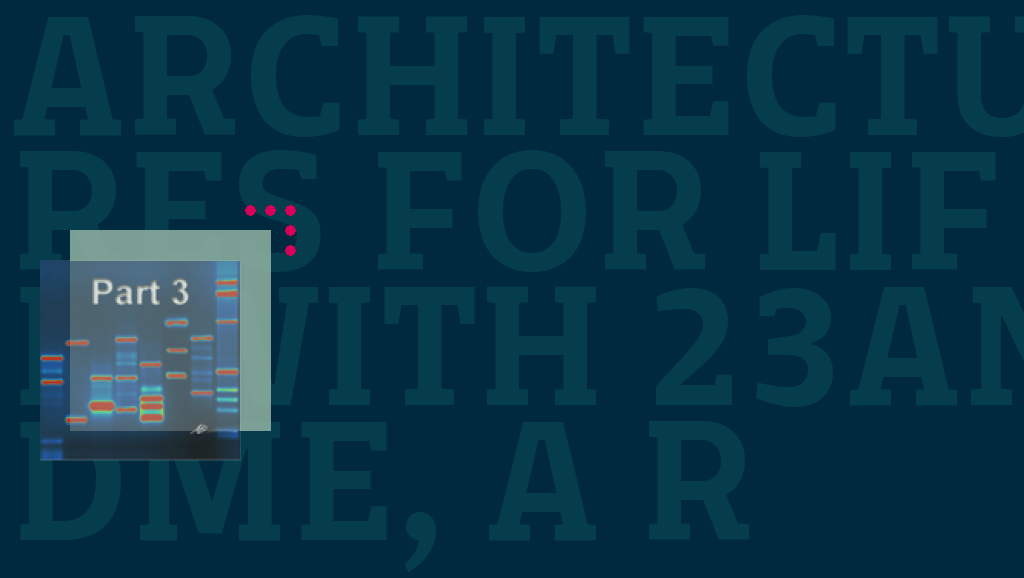(…continues from the previous entry).
During the afternoon panel Sharon Terry of the Genetic Alliance explained her interest in creating partnerships between genetic databases in order to use the massive number of participants and wealth of genetic materials available but currently divided between different databases. She talked about the need to move the information about and to ship materials and findings between research institutions in order to best use it, something that the Genetic alliance project is currently promoting and doing.
Sociologist Ruha Benjamin talked about how groups are conducting their own informal drug trails using the information and medication they can now access and through online communication. She mentioned an informal trail into breast cancer treatment and the effects that online activity has on drug testing, with people asking each other about side effects and symptoms in order to gain information about their positions within the trails. In the cases discussed the spread of available information can really be seen as playing a role (both socially and scientifically) for those participating in drug trials or suffering from diseases that involve well organized groups pooling resources and information. She also mentioned the Prop 71 project in California and the social system that the funding helped to create and maintain.
Patricia Williams of Columbia Law School went into some detail in her analysis of the contract that customers of 23andMe sign in order to obtain their services. She stated that the contract was very difficult to understand even for her. One thing that is clear is that the data obtained from the DNA analysis can be exploited for commercial gain. It can also be given to other organizations (ideally for research purposes) but not rented or sold, and that the company itself is not legally responsible for anything, has no liability whatsoever for uses made or effects caused even to the point of including quality of their analysis. One question raised was to ask in the case of bankruptcy what would happen to the data, defined as it is as asset of the company? Her analysis was quite brutal. She said that the company had included everything possible in their disclaimer and had also given themselves the right to change the contract at any time after it had been signed, merely by publishing the new version on its website.
A member of the audience did however point out that all internet based contracts are of this type, and that this contract was no worse than others, although the debate did make me (and others including legal experts present) wonder about the real value for the customer of such a document.
The concluding remarks raised some interesting points, not least the question “what is 23andMe?’ Is it a corporation, a product, a research institution or a product? How can we define ethical guidelines if we do not know how to classify it when different definitions require different frameworks and responsibilities? Is it an individual’s right to know their DNA analysis when it could in fact be seen as a very shared experience? Who should be in charge of large databases of genetic information and which logic should they adopt in their management (an implicit criticism that the logic of commerce may not be right)?
An interesting couple of days that raised a lot of questions about responsibility and innovation on the whole, the role of commercial bodies in science, regulation of fast moving areas of discovery, interpretation of personal data, citizen science and rights, responsibility to the whole of society and data protection, openness and privacy, to name just a few.
Issues surrounding the direct to consumer marketing of DNA testing have been addressed several times both on the Bassetti Foundation website and through our funding program.
In November 2009 we signaled the availability of over the counter DNA kits being made available for purchase in the UK for the first time. The article has links to interviews and news coverage of the event as well as websites offering doubts over the use of such kits.
During the 2010/11 academic year the Bassetti Foundation co-funded Margaret Curnutte, PhD Candidate at the University of Milan, European School for Molecular Medicine in her Fellowship at the Program on Science, Technology & Society at Harvard University. This article announcing her paper delivery at the Bassetti Foundation Conference Suite in Milan outlines her work and contains links to many of the other articles available on this website that treat this and similar arguments.
A downloadable abstract of her talk is available here and a podcast and video of the event here, along with more information, photos and a copy of the slides used during her presentation.
Any interested reader can search the Bassetti Foundation website using the key on the home page. The term DNA brings up several more articles that address the problem of patenting genes, forensic science, privacy and genetic modification, to name but a few.
———————-
(photo: Micah’s DNA by micahb37 from Flickr)
















